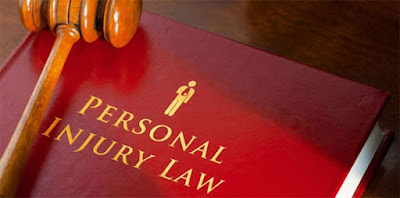Unveiling the Power
of Personal Injury Lawyers: Your Ultimate Guide to Legal Advocacy
Introduction
In the unpredictable journey of life, accidents and mishaps are unwelcome guests that can turn your world upside down in the blink of an eye. Personal injuries can be physically, emotionally, and financially devastating, leaving victims with a daunting path to recovery. During such trying times, a personal injury lawyer becomes your beacon of hope, offering guidance, legal expertise, and a chance at justice.
This comprehensive guide will delve into the world of personal injury lawyers, shedding light on their roles, the cases they handle, why you may need one, and how to find the right attorney to champion your cause. Whether you're a victim seeking justice or someone curious about this vital legal profession, this article will provide valuable insights into the realm of personal injury law.
Understanding Personal Injury Lawyers
Personal injury lawyers, also known as personal injury attorneys or PI lawyers, are legal professionals who specialize in representing individuals who have suffered physical or psychological harm due to the negligence or intentional wrongdoing of another party. Their primary objective is to seek compensation for their clients to help them recover from their injuries, both physically and financially.
The Role of a Personal Injury Lawyer
1.Legal Advocacy:
One of the core responsibilities of a personal injury lawyer is to advocate for their clients. They work tirelessly to build a strong case, collect evidence, interview witnesses, and negotiate with insurance companies or opposing parties to secure a fair settlement.
2.Expertise in Personal Injury Law:
Personal injury law encompasses a wide range of cases, from car accidents and slip and fall incidents to medical malpractice and product liability claims. Personal injury lawyers have an in-depth understanding of the relevant laws and regulations in their jurisdiction, allowing them to navigate the legal system effectively.
3.Evaluation of Damages:
Calculating the true cost of an injury is a complex task. Personal injury lawyers assess the extent of physical, emotional, and financial damages their clients have suffered. This evaluation helps determine the appropriate compensation amount to seek.
4.Negotiation and Settlement:
Many personal injury cases are resolved through negotiation rather than going to trial. A skilled personal injury lawyer will engage in negotiations with the opposing party or their insurance company to secure a settlement that meets their client's needs.
5.Litigation:
If a fair settlement cannot be reached through
negotiation, a personal injury lawyer will proceed to file a lawsuit and
represent their client in court. They will present the case before a judge and
jury, arguing for compensation on their client's behalf.
Types of Personal Injury Cases
Personal injury lawyers handle a wide variety of cases, including:
1.Car Accidents:
Traffic accidents are a leading cause of personal injury claims. Lawyers in this field specialize in cases involving car, motorcycle, truck, and pedestrian accidents.
2.Slip and Fall Accidents:
Property owners have a legal duty to maintain safe premises. Personal injury lawyers represent individuals who have been injured due to hazardous conditions on someone else's property.
3.Medical Malpractice:
When medical professionals fail to provide an acceptable standard of care, resulting in injury or death, a medical malpractice case may arise.
4.Product Liability:
Personal injury lawyers may represent individuals who have been harmed by defective products, such as faulty machinery, drugs, or consumer goods.
5.Workplace Accidents:
Injuries sustained at the workplace can lead to workers' compensation claims or personal injury lawsuits against third parties.
6.Dog Bites:
Personal injury lawyers can help victims of dog attacks seek compensation from negligent pet owners.
7.Defamation and Libel:
In some cases, personal injury lawyers may handle defamation cases where a false statement has caused harm to an individual's reputation.
Why You May Need a Personal Injury Lawyer
If you've experienced a personal injury, you might wonder whether you need legal representation. Here are some compelling reasons to consider hiring a personal injury lawyer:
1.Legal Expertise:
Personal injury cases can be complex, involving intricate laws and regulations. Lawyers have the legal knowledge and experience to navigate these complexities effectively.
2.Maximizing Compensation:
Insurance companies often try to settle for the lowest possible amount. Personal injury lawyers have the skills to negotiate for fair compensation that covers medical expenses, lost wages, pain and suffering, and more.
3.Investigation and Evidence:
Lawyers have the resources to conduct thorough investigations and gather evidence to support your case. This can be crucial in proving liability and securing a favorable outcome.
4.Peace of Mind:
Dealing with a personal injury is already stressful enough. Hiring a lawyer allows you to focus on your recovery while they handle the legal aspects of your case.
5.Trial Representation:
If your case goes to trial, having a seasoned personal injury lawyer by your side ensures you have strong representation in court.
How to Choose the Right Personal Injury Lawyer
Selecting the right personal injury lawyer is a critical decision. Here are some tips to help you make an informed choice:
1.Experience:
Look for a lawyer with a proven track record of
handling personal injury cases similar to yours. Experience matters when it
comes to navigating the complexities of these cases.
2.Reputation:
Research the lawyer's reputation in the legal community and read client reviews. A good reputation can be a strong indicator of their competence and reliability.
3.Communication Skills:
Effective communication is key. Choose a lawyer who is responsive and attentive to your needs, as open and clear communication is vital throughout the legal process.
4.Fee Structure:
Discuss the lawyer's fee structure upfront. Many personal injury lawyers work on a contingency fee basis, meaning they only get paid if you win your case. Be sure to understand the terms of the fee arrangement before proceeding.
5.Compatibility:
Personal injury cases can take time to resolve. Ensure you feel comfortable working with the lawyer you choose and that you trust their judgment.
Conclusion
In the realm of personal injury law, lawyers serve as champions of justice for those who have suffered harm through no fault of their own. Their role is multi-faceted, encompassing legal advocacy, negotiation, litigation, and compassionate support for their clients. Whether you've been involved in a car accident, experienced a slip and fall, or faced any other type of personal injury, a skilled personal injury lawyer can make a world of difference in your journey to recovery.
Remember, choosing the right personal injury lawyer is a
crucial decision. Take your time to research, consult, and select an attorney
who will fight tirelessly on your behalf, ensuring you receive the compensation
and justice you rightfully deserve. In times of adversity, these legal advocates
are your unwavering allies, guiding you towards a brighter future.

.jpeg)




